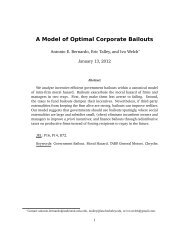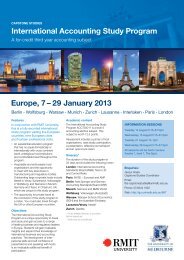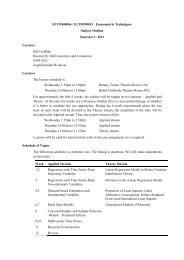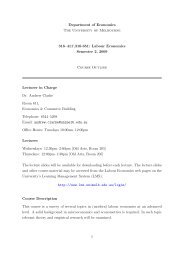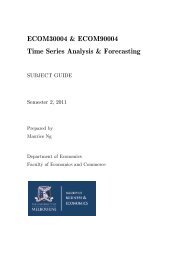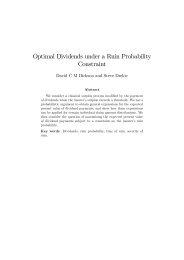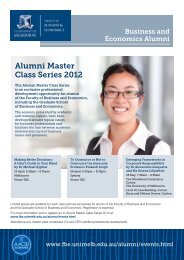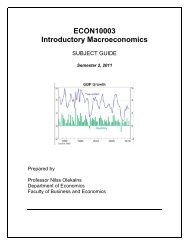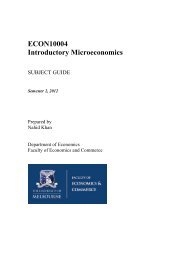ECOM20001 (316-205) Introductory Econometrics - Department of ...
ECOM20001 (316-205) Introductory Econometrics - Department of ...
ECOM20001 (316-205) Introductory Econometrics - Department of ...
Create successful ePaper yourself
Turn your PDF publications into a flip-book with our unique Google optimized e-Paper software.
<strong>ECOM20001</strong> (<strong>316</strong>-<strong>205</strong>)<br />
<strong>Introductory</strong> <strong>Econometrics</strong><br />
SUBJECT GUIDE<br />
Semester 1, 2012<br />
Prepared by<br />
Joe Hirschberg<br />
<strong>Department</strong> <strong>of</strong> Economics<br />
Faculty <strong>of</strong> Economics and Commerce<br />
1
Contents<br />
1. STAFF CONTACT DETAILS ......................................................................................................... 3<br />
LECTURER CONTACT DETAILS ............................................................................................................. 3<br />
HEAD TUTOR CONTACT DETAILS ......................................................................................................... 3<br />
EMAIL PROTOCOL ................................................................................................................................. 3<br />
2. SUBJECT DETAILS ......................................................................................................................... 3<br />
LECTURES TIMES .................................................................................................................................. 3<br />
TUTORIALS ........................................................................................................................................... 4<br />
ENROLLING IN TUTORIALS ................................................................................................................... 4<br />
REVISION LECTURES ............................................................................................................................ 4<br />
TEXTBOOKS .......................................................................................................................................... 4<br />
ASSESSMENT ........................................................................................................................................ 4<br />
SUMMARY OF ASSESSMENT VALUES AND DATES .................................................................. 5<br />
TUTORIAL ATTENDENCE AND PARTICIPATION ..................................................................... 5<br />
MID-SEMESTER EXAM (OPTIONAL) .......................................................................................... 6<br />
ASSIGNMENTS ............................................................................................................................... 6<br />
END-OF-SEMESTER EXAM .......................................................................................................... 6<br />
PLAGIARISM AND COLLUSION .............................................................................................................. 7<br />
SPECIAL CONSIDERATION ..................................................................................................................... 7<br />
LMS ..................................................................................................................................................... 7<br />
3. LEARNING OUTCOMES ............................................................................................................... 8<br />
SUBJECT OBJECTIVES ........................................................................................................................... 8<br />
GENERIC SKILLS ................................................................................................................................... 8<br />
4. LECTURE OUTLINE, SCHEDULE AND REQUIRED READINGS ......................................... 9<br />
5. OTHER SUBJECT RESOURCES ................................................................................................ 11<br />
LECTURE NOTES ................................................................................................................................. 11<br />
AUDIO/VIDEO LECTURES .................................................................................................................... 11<br />
DATA .................................................................................................................................................. 11<br />
TUTOR CONSULTATION TIMES ........................................................................................................... 12<br />
ONLINE TUTOR ................................................................................................................................... 12<br />
COMPUTER LABS AND SOFTWARE ...................................................................................................... 12<br />
TEACHING & LEARNING UNIT ............................................................................................................ 13<br />
6. SUBJECT PRIZES .......................................................................................................................... 13<br />
2
1. Staff Contact Details<br />
Lecturer Contact Details<br />
Associate Pr<strong>of</strong>essor Joe Hirschberg<br />
Email: j.hirschberg@unimelb.edu.au<br />
Room: Rm. 626 Arts West (Old Economics and Commerce Bldg)<br />
Phone: 8344-5273<br />
Consultation Hours: Monday 10-12<br />
Head Tutor Contact Details<br />
Dr. Wasana Karunarathne<br />
Email: lakminik@unimelb.edu.au<br />
Room: 615 Arts West (Old Economics and Commerce Bldg)<br />
Phone: 8344-4866<br />
Consultation Hours: Wednesday 12-2<br />
Email Protocol<br />
Please note that we are only able to respond to student emails coming from a<br />
University email address. Please do not use personal email addresses such as Yahoo,<br />
Hotmail or even business email addresses. Emails from non-University email<br />
addresses may be filtered by the University’s spam filter, which means that we may<br />
not receive your email. All correspondence relating to this subject will only be sent to<br />
your University email address. Note that you must first activate your University<br />
email address before you can send or receive emails at that address. You can activate<br />
your email account at this link: http://accounts.unimelb.edu.au/.<br />
While academic staff endeavour to address queries received via email, it is more<br />
appropriate to resolve substantive questions after lectures, at tutorials and during<br />
normal consultation hours. With this in mind, we encourage students to attend all<br />
lectures and tutorials and to familiarize themselves with the consultation hours <strong>of</strong>fered<br />
by the lecturers and tutors in this subject. Your first contact should be with the Online<br />
Tutor who is available via the LMS site for this subject.<br />
2. Subject Details<br />
Lectures Times<br />
Day Time Theatre<br />
Tuesday 2:15pm - 3:15pm The Spot-Basement Theatre<br />
Thursday 2:15pm - 3:15pm The Spot-Basement Theatre<br />
3
Tutorials<br />
There will be 1 hour tutorial per week starting from Week 1 –Preliminary tutorial<br />
which will cover the basics <strong>of</strong> using the computer program Eviews. To enrol in a<br />
tutorial use the university-wide Alloc8 on-line tutorial enrolment system. Note<br />
Tutorial participation will account for 5% <strong>of</strong> your total mark in this subject.<br />
However, note that participation in the preliminary Tutorial to be held in Week 1 will<br />
not count towards the Tutorial participation mark.<br />
It is important that you attend the tutorial to which you are allocated. If you attend<br />
another tutorial, there is a danger that you will not have your assignments properly<br />
assessed and you will lose valuable marks as a result. Note that tutors cannot<br />
authorise transfers from one tutorial to another, not even from one <strong>of</strong> their own<br />
tutorials to another <strong>of</strong> their own tutorials. For any problems with tutorials, you should<br />
see the tutorial coordinator.<br />
Enrolling in Tutorials<br />
You must enrol in a tutorial using the ISIS Student Timetable by 5pm Friday March<br />
11 th . Information is available at:<br />
http://www.csc.unimelb.edu.au/planning/timetables.html<br />
Note that all late enrolment into tutorials and tutorial changes is handled by the<br />
Commerce Student Centre (Level 1, 198 Berkeley Street). Note that students are<br />
required to attend the tutorial that they have been allocated to.<br />
Revision Lectures<br />
There will be three exam review sessions. The first will cover questions as a practice<br />
for the mid-semester test. In the other two, practice exam questions will be reviewed.<br />
These sessions will occur in weeks 4, 7 and 12. Details <strong>of</strong> the times and location <strong>of</strong><br />
these reviews and questions to be covered will be available on LMS.<br />
Textbooks<br />
The prescribed texts are: Principles <strong>of</strong> <strong>Econometrics</strong>, fourth edition, by Hill, Griffiths<br />
and Lim (referred to as HGL4); Using Eviews for Principles <strong>of</strong> <strong>Econometrics</strong>, fourth<br />
edition, by Griffiths, Hill and Lim (referred to as GHL4). These books are sold<br />
together with Eviews 7 student s<strong>of</strong>tware. The website address for the book is:<br />
http://bcs.wiley.com/he-bcs/Books?action=index&itemId=0470626739&bcsId=6211<br />
You can use either the third or fourth edition <strong>of</strong> either book though the 3 rd edition <strong>of</strong><br />
the Eviews guide refers to Eviews 6 which is not available in the labs. The reading<br />
lists for both editions are provided in the lecture schedule listed below.<br />
Assessment<br />
A 2-hour end-<strong>of</strong>-semester examination (65% or 75%), an optional mid-semester<br />
multiple choice test in week 5 (0% or 10%), Assignment 1 (10%) due week 8: 10<br />
4
pages A4, Assignment 2 (10%) due week 12: 10 pages A4, and tutorial attendance<br />
and participation (5%).<br />
The final mark will be calculated by weighting the end-<strong>of</strong>-semester exam at 65% and<br />
the mid-semester test at 10% OR by weighting the end-<strong>of</strong>-semester exam at 75% and<br />
the mid-semester test at 0%, whichever gives the higher mark.<br />
SUMMARY OF ASSESSMENT VALUES AND DATES<br />
TYPE VALUE DUE DATE<br />
Tutorial participation 5% Tutorial 1-Tutorial 11 (Tutorials held<br />
weeks 2-12)<br />
Mid Semester Test 10% (0%) To be held during Lecture 9 on March<br />
27 th<br />
Assignment 1 10% Due by 4pm on the April 26 th<br />
Assignment 2 10% Due by 4pm on the May 17 th<br />
End <strong>of</strong> Semester Exam 65% (75%) To be advised<br />
Each Assignment will contain one past exam question and one empirical question that<br />
requires the use <strong>of</strong> Eviews. In particular:<br />
Assignment 1 – contains one question on simple regression and different functional<br />
forms (past exam question) and one question on the quadratic specification.<br />
Assignment 2 – contains 1 question on heteroskedasticity (past exam question) and<br />
one question on dummy variables.<br />
TUTORIAL ATTENDENCE AND PARTICIPATION<br />
Students are to download the tutorial problem sheets from the LMS each week.<br />
Tutorial participation will account for 5% <strong>of</strong> your total mark in this subject. The<br />
marks for tutorial participation (including attendance) will only be allotted by the<br />
student’s regular (<strong>of</strong>ficial) tutor. The two criteria that will be used by your tutor in<br />
awarding your mark are: Attendance (Tutorials 2-12) and evidence <strong>of</strong> preparation<br />
for the tutorial. Note that simply attending the tutorial is not sufficient to obtain full<br />
marks. At least one full tutorial question must have been attempted before the<br />
tutorial. Also note that the preliminary tutorial to be held in Week 1 <strong>of</strong> lectures does<br />
not count towards the tutorial participation mark.<br />
As your mark will be allocated by your <strong>of</strong>ficial tutor: check with your tutor that your<br />
name is on the tutor’s <strong>of</strong>ficial tutorial roll. Also ensure that any note issued to you for<br />
attendance at another tutorial is given to your regular tutor check that if you transfer<br />
from one tutorial to another during the semester that your ‘old’ tutor has made<br />
arrangements for your tutorial mark (to the time <strong>of</strong> transfer) has been transferred to<br />
your new tutor. Make sure to attend any other tutorial during the week if you miss<br />
your regular tutorial for illness and collect an irregular attendance form from that<br />
tutor.<br />
5
MID-SEMESTER EXAM (OPTIONAL)<br />
The mid-semester exam will be held during Lecture 9 (March 27 th ) in the usual<br />
lecture venue at the usual time. It will cover the material presented during lectures<br />
up to the end <strong>of</strong> Lecture 6.<br />
Note: Due to the optional nature <strong>of</strong> the Mid-semester exam Students will not be able<br />
to reschedule the Mid-semester exam for any reason.<br />
All students are strongly urged to take the mid-term exam in order to gauge how they<br />
are progressing in the subject and because the mark you receive for it cannot lower<br />
your total mark but could make your total mark in the subject higher. Because this<br />
exam is optional if you do not take it the final examination will count for 75% <strong>of</strong> the<br />
total mark. If the mid-term is taken but the final mark is higher without the mark for<br />
the mid-term examination, it will be dropped and the higher mark will be awarded for<br />
the subject.<br />
ASSIGNMENTS<br />
There will be two assignments.<br />
Assignment 1 (10%) due by 4pm on Thursday April 26 th .<br />
Assignment 2 (10%) due by 4pm on Thursday May 17 th .<br />
Assignments must be submitted using the assignment tool maintained by the<br />
Commerce Student Centre. There is a path to the assignment tool on the LMS site for<br />
the subject. It can be found at:<br />
http://tlu.ecom.unimelb.edu.au/students/elearning/ass_tool.html.<br />
You are required to submit the assignments by 4pm on the due date. We need to be<br />
able to post solutions to the Assignments on LMS and we want to be able to return<br />
assignments to students as soon as possible. Hence:<br />
Late Assignments will NOT be accepted<br />
Students with a genuine and acceptable reason for not completing an assignment, such<br />
as illness, can apply to the tutorial coordinator to have their marks for that assignment<br />
transferred to the final exam. Suitable evidence, such as a doctor’s certificate is<br />
required. Applications made more than 3 days after the assignment is due will not be<br />
considered. Tutors do not have the authority to accept late assignments.<br />
END-OF-SEMESTER EXAM<br />
The end <strong>of</strong> semester exam, worth 65% (75% 1 ) <strong>of</strong> the final grade for this subject, will<br />
cover all the material covered during lectures and tutorials throughout the semester.<br />
This exam will occur during the University's normal end <strong>of</strong> semester assessment<br />
period, with the time, date and location provided by the University's administration<br />
1 If the mid-semester exam is not counted.<br />
6
later in the semester. The exam will be 2 hours in duration. All critical value tables<br />
for each distribution required to complete the exam will be provided to students in the<br />
exam package, as will a formula sheet – these will be made available prior to the date<br />
<strong>of</strong> the examination. Students will be required to bring a non-programmable calculator<br />
to the end <strong>of</strong> semester exam.<br />
Plagiarism and Collusion<br />
Presenting material from other sources without full acknowledgement (referred to as<br />
plagiarism) will be heavily penalised. Penalties for plagiarism can include a mark <strong>of</strong><br />
zero for the piece <strong>of</strong> assessment or a fail grade for the subject.<br />
Plagiarism is the presentation by a student <strong>of</strong> an assignment identified as his or her<br />
own work even though it has been copied in whole or in part from another student’s<br />
work, or from any other source (e.g. published books, web-based materials or<br />
periodicals), without due acknowledgement in the text.<br />
Collusion is the presentation by a student <strong>of</strong> an assignment as his or her own work<br />
when it is, in fact, the result (in whole or in part) <strong>of</strong> unauthorised collaboration with<br />
another person or persons. Both the student presenting the assignment and the<br />
student(s) willingly supplying unauthorised material are considered participants in the<br />
act <strong>of</strong> academic misconduct.<br />
See http://www.services.unimelb.edu.au/plagiarism/plagiarism.html for more<br />
information.<br />
The Teaching and Learning Unit has developed a web-based ‘Academic Honesty<br />
Module’ that allows you to learn more about and test your knowledge <strong>of</strong> plagiarism<br />
and collusion. You are strongly encouraged to complete this module, which can be<br />
accessed at: http://tlu.ecom.unimelb.edu.au/AcademicHonestyTest/index.cfm<br />
Special Consideration<br />
Students who have been significantly affected by illness or other serious<br />
circumstances during the semester may be eligible to apply for Special Consideration.<br />
The following website contains detailed information relating to who can apply for<br />
Special Consideration and the process for making an application:<br />
http://www.ecom.unimelb.edu.au/students/special/#missing<br />
LMS<br />
LMS is accessed at the website http://www.lms.unimelb.edu.au. To log on use the<br />
same username and password that you use to access your University <strong>of</strong> Melbourne<br />
email account.<br />
LMS will contain Lecture notes, Lecture Slides, Audios <strong>of</strong> Lectures, Tutorial<br />
Questions and Answers, Practice Questions, Practice Multiple Choice Tests, Practice<br />
7
Exams, Revision Exercises and Announcements. LMS will also contain access to<br />
data to be used in Lectures and data for tutorial questions and assignments.<br />
3. Learning Outcomes<br />
Subject Objectives<br />
The primary objective <strong>of</strong> this subject is to provide an introduction to the theory and<br />
application <strong>of</strong> econometric methods. The topics <strong>of</strong> the subject cover the basic tools <strong>of</strong><br />
estimation and inference in the context <strong>of</strong> the single-equation linear regression model<br />
in which the least squares method <strong>of</strong> estimation is used. Emphasis is given to the<br />
intuitive understanding and practical application <strong>of</strong> these basic tools <strong>of</strong> regression<br />
analysis using the econometric s<strong>of</strong>tware Eviews. Empirical applications that are<br />
representative <strong>of</strong> modern practice are also presented.<br />
Students who complete this subject will be able to:<br />
<br />
<br />
<br />
<br />
Apply the least squares estimation to the context <strong>of</strong> the simple (twovariable)<br />
linear regression model.<br />
Apply the principles <strong>of</strong> the least squares estimation and inference to the<br />
multiple linear regression model.<br />
Apply Eviews to estimate, test hypotheses and forecast in the context <strong>of</strong><br />
the linear regression model<br />
Explain various problems that arise from applying the linear regression<br />
model to data including multicollinearity, specification errors,<br />
heteroskedasticity and non-stationarity.<br />
Generic Skills<br />
In this subject you will have the opportunity to develop important generic skills.<br />
These skills are grouped below by level <strong>of</strong> development.<br />
High level <strong>of</strong> development: statistical reasoning; application <strong>of</strong> theory to practice;<br />
interpretation and analysis; synthesis <strong>of</strong> data and other information; evaluation <strong>of</strong> data<br />
and other information; and use <strong>of</strong> computer s<strong>of</strong>tware.<br />
Moderate level <strong>of</strong> development: written communication; critical thinking; problem<br />
solving; and receptiveness to alternative ideas; evaluation <strong>of</strong> ideas, views and<br />
evidence, synthesis <strong>of</strong> ideas, views and evidence.<br />
Some level <strong>of</strong> development: accessing data and other information from a range <strong>of</strong><br />
sources; strategic thinking.<br />
8
4. Lecture Outline, Schedule and Required Readings<br />
Lecture Dates Topic Reading<br />
Week 1: Lect. 1 Feb 28 Overview &<br />
Introduction to<br />
Eviews<br />
GHL3 pp.3-23<br />
GHL4 pp.3-23<br />
Week 1: Lect. 2 March 1 Review <strong>of</strong><br />
Probability<br />
Week 2: Lect. 3 March 6 Simple Linear<br />
Regression I<br />
Week 2: Lect. 4 March 8 Simple Linear<br />
Regression II<br />
Week 3: Lect. 5 March 13 Properties <strong>of</strong> Least<br />
Squares Estimators<br />
Week 3: Lect. 6 March 15 Goodness <strong>of</strong> Fit<br />
Applications &<br />
Scaling<br />
Week 4: Lect. 7 March 20 Interval Estimation<br />
& Least Squares<br />
Prediction<br />
HGL3 pp. 464-466;<br />
479-497<br />
HGL4 pp 17-34;<br />
635-637; 641-643;<br />
680-683<br />
HGL3 pp. 9-22<br />
HGL4 pp. 39-54<br />
HGL3 pp. 22-23;<br />
HGL4 pp. 54-56<br />
GHL3 pp. 45-48;<br />
51-52<br />
GHL4 pp. 63-66;<br />
69-71<br />
HGL3 pp. 26-35<br />
HGL4 pp. 56-68<br />
HGL3 pp. 80-85<br />
HGL4 pp. 135-140<br />
HGL3 pp. 49-53;<br />
76-79;<br />
HGL4 pp. 94-99;<br />
131-135<br />
GHL3 pp. 56-59<br />
GHL4 pp. 76-79<br />
HGL3 pp. 54-68<br />
HGL4 pp. 100-114<br />
See LMS<br />
Week 4: Lect. 8 March 22 Hypothesis Testing<br />
& Summary<br />
Revision Date tba Special Lecture –<br />
Practice Mid-<br />
Semester Test<br />
Review<br />
Week 5: Lect. 9 March 27 Mid-Semester Test held during Lecture –<br />
coverage Lectures 1-6.<br />
Week 5: Lect. 10 March 29 Functional Form &<br />
Jarque-Bera Test<br />
Week 6: Lect. 11 April 3 Multiple Regression<br />
Model<br />
HGL3 pp. 23-24;<br />
86-90<br />
HGL4 pp. 54-55;<br />
140-145; 151-152;<br />
156-157<br />
HGL3 pp. 105-<br />
118; 124-126<br />
HGL4 pp. 167-<br />
181; 198-199<br />
9
Lecture Dates Topic Reading<br />
Week 6: Lect. 12 April 5 Quadratic Model &<br />
Interval Estimation<br />
& Hypothesis<br />
Testing<br />
HGL3 pp. 140-<br />
141; 118-124<br />
HGL4 pp. 189-<br />
193; 182-188<br />
Easter Break Friday April 6 to Sunday April 15<br />
Week 7: Lect. 13 April 17 Significance <strong>of</strong><br />
Regression &<br />
Linear Restrictions<br />
& Summary<br />
Revision Date tba Special Lecture –<br />
Practice Exam<br />
Questions Review<br />
Week 7: Lect. 14 April 19 Dummy (Indicator)<br />
Variables I<br />
Week 8: Lect. 15 April 24 Dummy Variables<br />
II<br />
Week 8: Lect. 16<br />
Assignment 1 due<br />
by 4pm <strong>of</strong> the 26 th .<br />
April 26<br />
Dummy Variables<br />
& Summary<br />
HGL3 pp. 135-<br />
140;<br />
HGL4 pp. 221-<br />
227;<br />
GHL3 116-119<br />
GHL4 186-188<br />
See LMS<br />
HGL3 pp. 170-<br />
172; 185-186;<br />
HGL4 pp. 259-<br />
261; 271-273<br />
GHL3 pp. 134-136<br />
GHL4 pp. 206-208<br />
HGL3 pp. 177-<br />
179; 172-175<br />
HGL4 pp. 266-<br />
268; 261-264<br />
HGL3 pp 181;<br />
HGL4 pp. 268-270;<br />
GHL3 pp. 140-142<br />
GHL4 pp. 212-214<br />
Week 9: Lect. 17 May 1 Multicollinearity HGL3 pp.153-156<br />
HGL4 pp. 240-243<br />
Week 9: Lect. 18 May 3 Model Specification HGL3 pp. 148-<br />
152;<br />
HGL4 pp. 233-<br />
239;<br />
GHL3 pp. 124-127<br />
GHL4 pp. 198-199<br />
Week 10: Lect. 19 May 8 Choosing Model;<br />
Summary & Past<br />
Exam Questions<br />
No assigned<br />
reading<br />
Week 10: Lect. 20 May 10 Heteroskedasticity I HGL3 pp 197-202;<br />
211-215<br />
HGL4 pp. 298-306<br />
GHL3 149-153;<br />
167-169<br />
GHL3 229-234;<br />
236-238<br />
10
Lecture Dates Topic Reading<br />
Week 11: Lect. 21 May 15 Heteroskedasticity<br />
II; Summary &<br />
Past Exam<br />
Questions<br />
HGL3 pp 197-202;<br />
211-215;<br />
HGL4 pp. 309-<br />
315;<br />
GHL3 154-157<br />
Week 11: Lect. 22 May 17 Time Series<br />
by 4pm May 17 th<br />
Assignment 2 due<br />
Modelling I<br />
Week 12: Lect. 23 May 22 Time Series<br />
Modelling II &<br />
Summary<br />
Revision Date tba Special Lecture –<br />
Practice Exam<br />
GHL4 243-250<br />
HGL3 pp. 326-<br />
338;<br />
HGL4 pp. 475-<br />
488;<br />
GHL3 219-224<br />
GHL4 325-329<br />
HGL3 328-341<br />
HGL4 488-490<br />
See LMS<br />
Review<br />
Week 12: Lect. 24 May 24 Review <strong>of</strong> Course No assigned<br />
reading<br />
5. Other Subject Resources<br />
Lecture Notes<br />
Lecture notes and slides will be made available on LMS. Note that the Lecture notes<br />
for Lectures 8, 13, 16, 19, 21, 23 and 24 contain summaries <strong>of</strong> the topics covered.<br />
These summaries will be useful for exam preparation.<br />
Audio/video Lectures<br />
Audio recordings <strong>of</strong> lectures and copies <strong>of</strong> computer screen images from this subject<br />
will be made available for review after each lecture. Recordings <strong>of</strong> lectures allow you<br />
to revise lectures during the semester, or to review lectures in preparation for the end<br />
<strong>of</strong> semester exam. You can access recorded lectures by clicking on the Lecture<br />
Recordings menu item in the LMS page for this subject.<br />
Be aware that lecture recordings are not a substitute for attendance; rather they are<br />
intended for revision. On rare occasions the recording system may fail to record the<br />
lecture due to technical reasons. In such cases, the lecture recording for that lecture<br />
will not be made available.<br />
Data<br />
LMS will contain access to data to be used in Lectures and data for tutorial questions<br />
and assignments.<br />
11
Tutor Consultation Times<br />
There are a number <strong>of</strong> tutors in this subject. During weeks that tutorials are scheduled<br />
each tutor will have a 1 hour designated consultation time. These times and locations<br />
will be available on the LMS website. Students can attend the consultation time <strong>of</strong><br />
any tutor.<br />
Online Tutor<br />
The Online Tutor allows you to direct questions to your tutor/lecturer via the LMS.<br />
The Online Tutor can be accessed 24 hours a day, 7 days a week. Tutors will attempt<br />
to answer your question within 24 hours (weekdays only).<br />
Your questions and the tutor’s answers can be accessed by all students in the subject,<br />
allowing everyone to benefit from the question and answer. Importantly, your<br />
identity will not be revealed to other students. Even if you don’t want to ask a<br />
question, you can still view existing questions and answers.<br />
Note that the Online Tutor is not designed to replace attendance at tutorials, but rather<br />
to complement the tutorial process. You can access the Online Tutor via the TLU<br />
Tools link, located in the navigation menu <strong>of</strong> this subject’s LMS page.<br />
Computer Labs and S<strong>of</strong>tware<br />
The s<strong>of</strong>tware used in this subject is Eviews 7 2 .<br />
Eviews7 (E7) can be accessed on campus at the Commerce Student Specialised Open<br />
access Computing Space located at 233 Bouverie Street. Details can be found at:<br />
http://www.ecom.unimelb.edu.au/services/computing/facilities.html<br />
A copy <strong>of</strong> the student version <strong>of</strong> Eviews 7 (E7) and manual is packaged with the<br />
Eviews guide for this subject. In addition the bookroom will have a number <strong>of</strong><br />
student versions <strong>of</strong> Eviews 7 available to purchase in stand-alone form.<br />
Alternatively, it is possible to use a freely available open source package that has<br />
much in common with Eviews called Gretl. I this program has the capability to read<br />
Eviews files. It can be downloaded at:<br />
http://gretl.sourceforge.net/<br />
Gretl is available for both MS Windows and MAC OS X. A document is available on<br />
LMS which shows how to replicate a number <strong>of</strong> our class exercises using Gretl.<br />
These examples are generated using Gretl for MS Windows. Because Gretl is an<br />
optional program we do not provide support.<br />
2 Eviews 6 is the earlier version that may be available with the 3 rd edition <strong>of</strong> the Eviews guide for<br />
this text. This program is compatible with all <strong>of</strong> the material covered in this subject with a few<br />
minor differences in menu structures and the look <strong>of</strong> the results.<br />
12
Teaching & Learning Unit<br />
The Teaching and Learning Unit <strong>of</strong>fers a wide range <strong>of</strong> support services to students.<br />
If you are having any difficulty in studying for this subject you could arrange a<br />
consultation with the Unit’s learning skills specialist. The learning skills specialist<br />
can review your current approaches to study and <strong>of</strong>fer advice on how to adjust to the<br />
demands <strong>of</strong> tertiary study. If you are a student from a non-English speaking<br />
background there is an English-as-a-Second-Language specialist who is available to<br />
help with your written work. Both <strong>of</strong> these specialists are available for face-to-face<br />
consultations or electronically through email. Go to the Faculty <strong>of</strong>fice to arrange for<br />
consultations or contact the specialists electronically through the Teaching and<br />
Learning Unit web page. The web page also contains a wide variety <strong>of</strong> study skills<br />
topics and information sheets for students, and a timetable <strong>of</strong> up-coming events,<br />
including focussed workshops, designed to support Economics and Commerce<br />
students in their study.<br />
The Teaching and Learning Unit is located on level 5 <strong>of</strong> "The Spot", 198 Berkeley<br />
Street. Please visit the TLU’s website – http://tlu.ecom.unimelb.edu.au/.<br />
Make use <strong>of</strong> the Teaching and Learning Unit. It is there to help.<br />
6. Subject Prizes<br />
<strong>Introductory</strong> <strong>Econometrics</strong> is sponsored by a trust for a student award. The State<br />
Chamber <strong>of</strong> Commerce Exhibition for <strong>Introductory</strong> <strong>Econometrics</strong> is awarded to the<br />
student who achieves the highest overall result in the subject. If more than one<br />
student is ranked first overall the prize will be shared.<br />
For full details <strong>of</strong> the State Chamber <strong>of</strong> Commerce Exhibition for <strong>Introductory</strong><br />
<strong>Econometrics</strong>, and all other subject prizes, please visit the Faculty website.<br />
http://www.fbe.unimelb.edu.au/students/prizes/<br />
13



